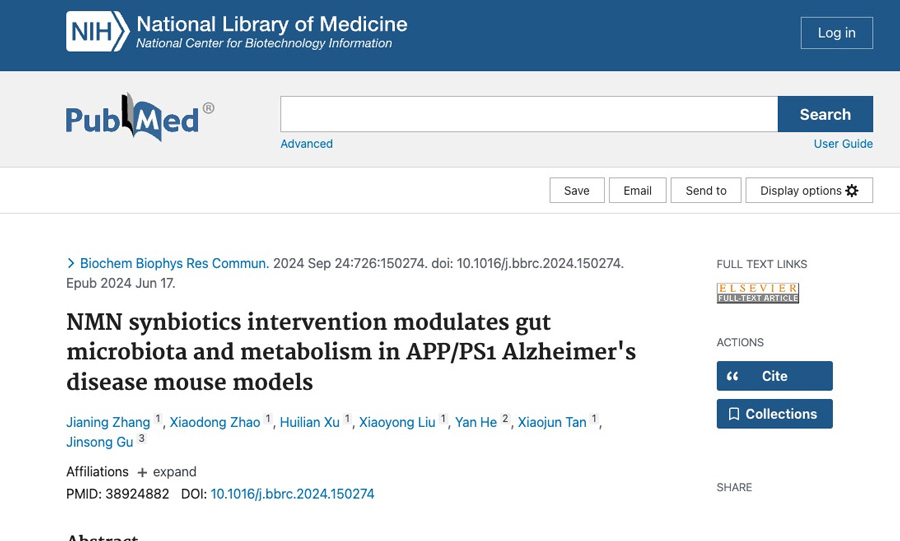
Nov 12, 2024 / Author: China Glutathione suppliers & NMN manufacturers
On September 24, 2024, an international authoritative journal published a human clinical trial of NMN, which explored the effects of β-Nicotinamide Mononucleotide (NMN) on blood NAD+ levels, physical function, especially walking function, and sleep quality in the elderly.

The results of the study showed that after 12 weeks of NMN intake, older adults in the NMN group had significantly higher levels of NAD+ and its metabolites in their blood compared to the placebo group.
Specifically, participants in the NMN group showed significant increases in blood concentrations of NAD+, NAM (nicotinamide), 2-PY (N1-methyl-2-pyridinone-5-carboxyamide), 4-PY (N1-methyl-4-pyridinone-3-carboxyamide), NaMN (niacin mononucleotide), and NaR (niacin riboside) after 12 weeks.
These results are consistent with previous studies suggesting that long-term ingestion of NMN can raise levels of NAD+ in the human blood.
NMN is a metabolic intermediate of coenzyme NAD+ in vivo.
As an essential coenzyme, NAD+ is involved in thousands of reactions within cells.
With age and other factors, the level of NAD+ in the body gradually declines, which can lead to a range of health problems.
The human body can replenish 85% of NAD+ mainly through the Salvage synthesis pathway, and NMN is the key substance in this pathway.

There are also Denovo pathway and Preiss-Handler pathway involved in NMN synthesis in vivo.
Ensure a steady supply of NAD + to the organism to support its various important physiological functions through different synthetic pathways.
Declining levels of NAD+ with age have been linked to age-related diseases in animals such as mice and rats and even humans, and increasing NAD+ with NMN improves these diseases.
NAD+ also activates a group of Sirtuins called "longevity proteins" and regulates their gene expression, thereby reducing the occurrence of disease and delaying aging.
Type 2 diabetes has often become a metabolic health problem around the world, and one of its signature features is insulin resistance caused by increased oxidative stress, inflammation, and disturbances in lipid metabolism. When pancreatic beta cells are dysfunctional or unable to secrete enough insulin, insulin deficiency results, leading to type 2 diabetes.
Pancreatic beta cells are susceptible to decreased NAD+ concentration. Once NAD+ levels are reduced, it may interfere with the metabolic activity of these cells, leading to reduced insulin production, which in turn increases the likelihood of developing diabetes.
Studies have shown that NMN can promote insulin release, improve peripheral tissue response to insulin, effectively treat diabetes, improve glucose tolerance and insulin sensitivity. NMN can also regulate fat metabolism, promote fat decomposition and oxidation, reduce fat resistance to insulin, long-term intake can increase NAD+ concentration, improve mitochondrial energy metabolism, reduce fat accumulation, and maintain healthy weight.
Vascular dysfunction refers to the functional lesions of blood vessels and nerves caused by various reasons in addition to organ damage.
Studies have shown that NMN can alleviate vascular oxidative stress, improve arteriosclerosis and dysfunction, reduce vascular collagen and increase elastin, thus delaying arterial aging.
NAD+ plays a key role in cardiac energy metabolism, and low NAD+ levels may lead to insufficient energy supply to cardiomyocytes.
In a mouse model of cardiomyopathy, NMN injection significantly increased NAD+ levels in cardiac mitochondria, activated SIRT3 enzyme, and improved cardiac function and energy metabolism.
NMN also has a positive effect on cerebral hemorrhage, alleviating cerebral edema, cell death, oxidative stress, neuroinflammation and neutrophil infiltration, and improving cerebral hemorrhage symptoms.
Acute kidney injury and acute lung injury are serious diseases with a high mortality rate. With age, SIRT1 and NAD+ levels in organisms decrease, especially in the kidneys, which increases the risk of acute kidney injury.
In a cisplatin induced mouse model of acute kidney injury, NMN supplementation can effectively resist the injury.
NMN also protects mice from lung injury induced by sepsis by increasing NAD+ and ATP levels, upregulating SIRT1 expression, and inhibiting NF-κB-p65 acetylation and phosphorylation, thereby reducing myeloperoxidase (MPO) levels in lung tissue.
Our study suggests that NMN promotes macrophage polarization through the SIRT1/NF-κB pathway and may be an effective strategy to prevent or treat sepsis induced acute lung injury.
Both animal experiments and human clinical studies have shown that NMN can not only increase the level of NAD+ in human blood, but also play a positive role in maintaining walking speed and improving sleep quality.
It also highlights the importance of NMN as a potential intervention in delaying aging and improving quality of life!
(1) https://pubmed.ncbi.nlm.nih.gov/38924882/
(2) https://www.frontiersin.org/journals/pharmacology/articles/10.3389/fphar.2024.1436597/full
Supplier Introduction: China glutathione supplier and NMN manufacturer GSHworld, the company mainly develops biotechnology and industrialization. As a global pioneer in enzymatic catalytic ATP regeneration technology, our company advocates green production and is committed to providing customers with better and more environmentally friendly products and services. Glutathione Manufacturer,NMN Factory,Citicoline Sodium supplier,China NMN manufacturers
+86-755-23577295
+86 18718790084
Room 832, Building 12, Shenzhen Bay Science and Technology Ecological Park, Yuehai Street, Nanshan District, Shenzhen China